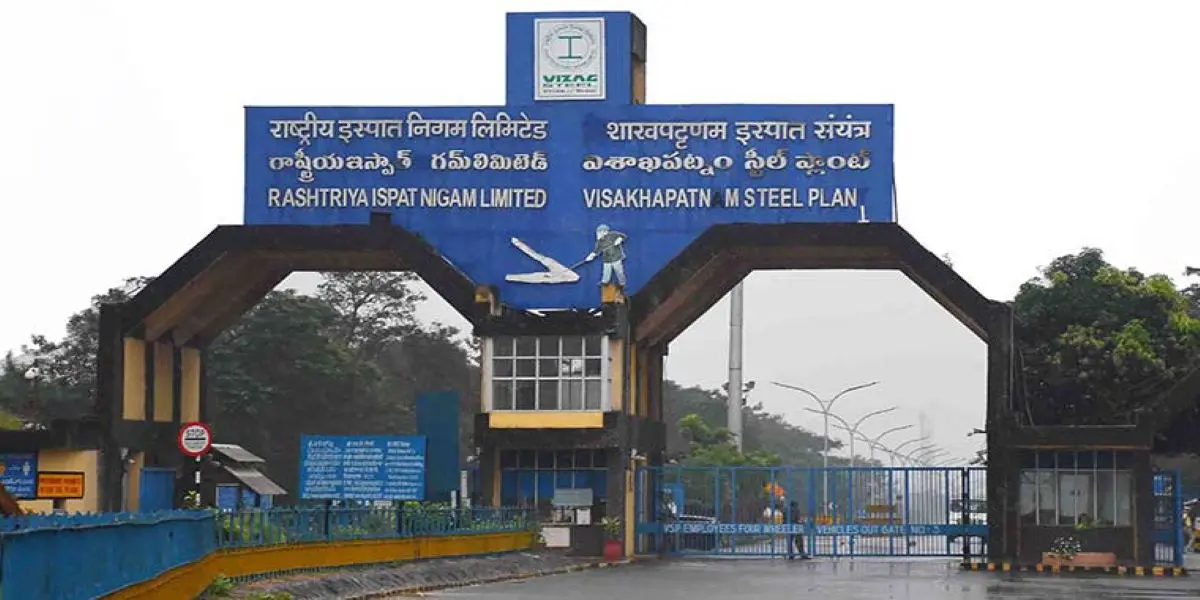The CCEA in January 2021 gave in-principle approval for 100 percent strategic disinvestment of the central government’s shareholding in RINL.
Published Dec 22, 2023 | 11:32 AM ⚊ Updated Dec 22, 2023 | 11:32 AM

Vizag Steel Plant. (Supplied)
The Rashtriya Ispat Nigam Ltd, known as Vizag steel plant, has forged a deal with Jindal Steel and Power Ltd to get an infusion of working capital up to ₹900 crore in a bid to propel sales revenue, monthly turnover and slash losses.
The timely deal enables the steel plant to procure raw material and start consistent Blast Furnace-3 (BF-3) operations with the planned blowing-in scheduled on 30 December at a capacity of two lakh tonnes of hot metal per month, an official said in Visakhapatnam on Thursday, 21 December.
“The arrangement with JSPL will ensure availability of about ₹800-900 crore for RINL in the form of working capital advance and raw materials required for consistent operation of BF-3, against which RINL will be supplying about 90,000 tonnes of cast blooms every month from Steel Melting Shop-2 (SMS-2) of RINL,” said Vizag Steel Plant’s chairman and managing director (CMD) Atul Bhatt in a meeting with the trade unions.
According to Bhatt, the arrangement with the New Delhi-headquartered JSPL will power Vizag Steel Plant to generate additional revenue from increased sales of about one lakh tonnes, even after supplying the committed quantity to the former.
The CMD noted that the deal will raise sales turnover to around ₹500 crore per month and also slash losses by about ₹100 crore per month.
In view of this deal, Bhatt appealed to the trade unions to enhance production and solicited the entire workforce’s support to ensure sustained growth and profitability.
Further, he clarified several queries raised by the trade unions and assured them that the steel plant’s management is implementing the best initiatives for its sustenance and profitability.
The activation of BF-3 has been positioned as a strategic move to optimise production capabilities and thereby contribute to the overall improvement of the steel plant’s financial position, he said.
The Cabinet Committee of Economic Affairs (CCEA) in January 2021 gave in-principle approval for 100 percent strategic disinvestment of the central government’s shareholding in RINL, along with management control, by way of privatisation.
Demanding that the Centre roll back its call, thousands of RINL’s Visakhapatnam Steel Plant (VSP) employees had protested.
The approximately 10,000 workers of the steel plant had boycotted work on 11 November 2022, to protest against Modi’s visit to Vizag.
Their demand was that the Centre must roll back its decision to privatise the Navaratna steel maker RINL, the flagship company of the Vizag steel plant.
The matter has been simmering for a while and, on 9 November 2022, the workers tried to take out a bike rally holding placards demanding Modi roll back the Centre’s decision on 100 percent divestment in the plant.
After the Centre’s decision to privatise, RINL notched a profit before tax in its latest results — after a gap of six financial years.
In the financial year (FY) 2021-22, RINL achieved a turnover of ₹28,215 crore — its highest since inception — marking an impressive growth of 57 percent over the previous year.
During the year, the company achieved an EBITDA — Earnings Before Interest, Taxes, Depreciation, and Amortisation — of ₹3,469 crore, recording a growth of 148 percent from the previous year.
The company also earned a cash profit of ₹1,923 crore in the financial year 2021-22.
The privatisation issue of Vizag Steel Plant has been in news since April 2023, with former Telangana minister KTR opposing the move, and using it as an attack against the BJP.
The BRS has claimed that the BJP is privatising the PSUs of country.
KTR, was, therefore, careful enough to link the privatisation of Vizag steel with prospects of the Bayyaram and Kadapa steel plants. Thus, he was trying to find a convergence of interest between Coastal Andhra and Rayalaseema regions on one side and both Telugu states on the other.
The issue of privatisation of the Vizag steel plant is most appropriate for essentially two reasons.
Firstly, it has a universal appeal across the political spectrum and regional boundaries.
Secondly, the three major political parties in the state — the YSR Congress, TDP, and Jana Sena, for their own reasons, have failed to take up the issue — as it would be a direct confrontation with the Modi regime.
The Vizag steel plant privatisation issue, unlike in other cases, is not an ideological binary of public sector versus private sector. It’s an emotional issue. Many even sacrificed their lives to get Vizag steel. Telugu people consider it their right.
The Union finance minister, who has a connect with the Telugu land, has repeatedly spoken in Parliament about the Modi government’s unwavering decision to hand over the Vizag steel plant to the private sector irrespective of whether this flagship company is making profits or losses.
The Modi government has been rudely rejecting all possible alternatives to privatisation effectively presented by the unions, political parties, and the state government.
(With PTI inputs)
